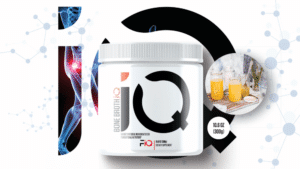
The Complete Guide to Leaky Gut Syndrome

By: Mike Casey
Entrepreneur, Health Coach, and Founder of FIQ, a Formula IQ company
The Complete Guide to Leaky Gut Syndrome: What is it, why does it happen, and what can you do about it? Leaky gut has recently entered the zeitgeist around gut health, autoimmune disease, proper diet — and for good reason.
Today’s western world is full of chronic stress, processed food, and bacterial imbalances. It’s no surprise that as the world’s first few “generations of convenience” get older, we are beginning to understand the negative consequences this convenience can bring more and more.
There are countless people who are struggling with symptoms of leaky gut and either aren’t aware, are conflating it with other issues, or aren’t sure how to treat it.
From sore joints, to fatigue, to thyroid disease, to increased mortality rates, lucky gut could be affecting your daily health more than you realize. The gut is often considered the “gateway to health”, so issues with your intestinal wall can lead to widespread symptoms in more ways than you may think.
In this article, we’ll be identifying the theories behind leaky gut, the definition, symptoms, and ways for you to combat and prevent leaky gut ailments.
WHAT IS LEAKY GUT?
Well… leaky gut is a somewhat broad term, and it has many names.
Some people call it leaky gut syndrome… medical literature refers to it as “hyperpermeability”…
While the medical diagnosis of leaky gut is still being contested in the medical field, the idea of “intestinal permeability” has been around for over a century in medical literature. We know that higher levels of intestinal permeability are related to celiac disease, Crohn’s disease, and irritable bowel syndrome, but the contention lies in where and how else a leaky gut can affect the body. This is exactly what the field is currently researching.
With that in mind, here’s how we like to think of leaky gut:
It’s essentially a weak bowel lining that allows more toxins and bacteria in than it should.
Inside our belly, we have intestinal lining that is longer than 4,000 square feet of surface area. This gut lining is naturally permeable, and its job is to let vital nutrients in while keeping toxins and germs out. The cells that line your gut regulate how porous your intestinal wall is, but this regulation can be disrupted and changed by reactions to certain foods or through infections, toxins, age, or general stress. Development of cracks, holes, or stretching the lining can trigger inflammation and alter the normal bacteria (gut flora) — potentially causing problems in the digestive tract and elsewhere.
For some individuals, this stress can occur from gluten. When gluten is absorbed it can make gut cells release a protein called zonulin that widens the pores and opens up the intestinal wall to toxins. Zonulin has been linked to inflammatory bowel conditions and is used in leaky gut syndrome testing (we cover that below).
So, in short, when your gut’s lining is more porous, it’s ability to keep out undesirables is less effective, resulting in germs, toxins, and other substances being absorbed into the bloodstream that shouldn’t.
When your body takes in those toxins accidentally, it can cause a whole host of issues.
WHAT CAUSES LEAKY GUT SYNDROME?
What exactly causes leaky gut is still up to debate, but the suspected culprits are:
CAUSE #1 – FOOD (ESPECIALLY PROCESSED)
Gluten is a frequent culprit in leaky gut cases, but alcohol, dairy, and sugars can also affect your gut — essentially any inflammatory foods can agitate your gut, and this increases manyfold when sensitivities or allergies are involved.
In addition, food emulsifiers, commonly used in ultra-processed products could modify the gut microbiota and intestinal permeability, which could increase the risk of autoimmunity. In contrast, unprocessed and minimally processed food-based diets have shown the capacity to promote gut microbiota eubiosis, anti-inflammatory response, and epithelial integrity, through bacterial butyrate production.
Here’s a more complete list of chemicals and ingredients to watch out for:
- Additives
- Meat Glue
- Sugars
- Sodium
- Emulsifiers
- Organic Acids
- Gluten
- Nanometric particles
You can start reducing your risk or helping mitigate your leaky gut by eliminating or at least reducing your intake of these foods and chemicals while swapping out those foods for gut-healing foods. We cover more examples of this below.
CAUSE #2 – INFECTIONS
Common infections that induce leaky gut are intestinal parasites, candida overgrowth, and small intestine bacterial overgrowth (also known as SIBO).
Intestinal Parasites
This is when a parasite makes a home in your gastrointestinal tract. We know. It’s gross, but it happens.
Symptoms may include abdominal pain, fatigue, gas, bloating, nausea, and even vomiting.
Candida Overgrowth
Candida is a type of fungus that normally lives in your body, but an infection called candidiasis can occur if it’s not controlled, and it is most common in people who have weakened immune systems.
Small Intestine Bacterial Overgrowth (SIBO)
This is when there is an excessive amount of bacteria found in your small intestine. Much like intestinal parasites, your risk for SIBO increases when you get sick and/or have a weakened immune system.
CAUSE #3 – TOXINS
You’ll get toxins most often from medication, including Advil, steroids, and antibiotics, but being exposed to pesticides, mercury, and BPA can also contribute to a leaky gut.
Limit your exposure and reliance to these substances, and you should be okay.
SIGNS AND SYMPTOMS OF LEAKY GUT SYNDROME
What makes leaky gut tricky is that many of the symptoms it can cause are easily confused with other diagnoses. But, if you have a collection of a few or many of the following, you should definitely get tested.
- Autoimmune disease
- Nutritional deficiencies
- Depression
- Thyroid Problems
- Headaches
- Joint pain
- Bloating
- Inflammatory bowel disease
- Irritable bowel syndrome
- Getting diagnosed with candida overgrowth
- Chronic fatigue
- Hormonal imbalances
WAYS TO TEST IF YOU HAVE LEAKY GUT
There are four primary tests for leaky gut:
Zonulin (Lactulose) Tests
Zonulin controls how large the pores are in your bowel. A Zonulin test drops two different sugar molecules (lactulose & mannitol) into your gut to see how much of them makes it into your urine, thus determining how porous your gut lining is.
IgG Food Intolerance Tests
The more your leaky gut allows in, the more effort and antibodies your body needs to fight against foods you may be sensitive or allergic to. This can lead to consistent low-level inflammation that can have small side effects in the short-term and produce larger health risks moving forward.
Checking for intolerances is a fairly simple process involving an in-person or shipped blood sample.
Stool Tests
Stool tests check for varying levels of bacteria and the overall health of your flora. They can also check your probiotic levels and your state of intestinal immune function.
Vitamin and Mineral Deficiencies
This urine-sample test observes your nutritional deficiencies — a potential indicator of a leaky gut. It can also give you an idea how of good your body is as absorbing nutrients.
Which test is right for me?
We’d start with the zonulin test since that is the clearest indicator of your intestinal permeability, but if the results are ambiguous, move on to a combination of the other tests.
If your concerns are cost or you do not wish to conduct certain types of tests, than choose the one that is best fit for your preferences — they are all helpful.
—
How can you heal a leaky gut?
When starting your fight against a leaky gut, it’s helpful to think about it in steps.
- Remove damaging food.
- Start eating gut-healing foods.
- Repair your gut with supplements.
- Balance your flora with probiotics.
Keep this flow in mind, and you’ll be all set. With this in mind, let’s look at your practical next steps.
Step #1 – Change your diet
Eat the right fats in moderation.
Don’t go overboard on these, but avocados, egg yolks, and ghee are good for and easy on the gut. Omega-3 fat sources such as salmon and grass-fed beef are also good to include in moderation
Start eating more coconut-based products
You can’t go wrong with coconut. They’re easy to digest and have good probiotics. They’re also a microbial, so they can help fight as candida overgrowth.
Embrace sprouted seeds
Sprout seeds including hemp, flax, pumpkin, and chia are rich in fiber that help produce a healthy flora. Pumpkin seeds in particular help reduce the environment in which harmful parasites like to thrive.
Just eat more fiber in general
Increasing fiber intake through fiber rich foods such as artichokes, asparagus, jicama, blackberries, and (again) seeds like flax and chia are beneficial to the colon by binding or diluting carcinogens in the intestinal tract, decreasing the conversion of bile acids to carcinogens.
Increasing fiber can also help slow the passage of food in people with chronic diarrhea!
Eat more fermented vegetables
Fermented vegetables balance your guts PH and support the gut. Time to get your sauerkraut kimchi on! We’re also big proponents of fermented taro (poi) since it is an incredible prebiotic.
Have 1-2 servings of fruit a day.
Eat fruits early on in the morning and in small amounts. Balance is key!
Add raw cultured dairy into your diet.
Raw cultured dairy is full of probiotics and SCFAs (short-chain fatty acids). These help heal the gut, and some common examples include raw cheese, yogurt, and butter.
For a specific brand, we’re big fans of Nancy’s full fat plain yogurt due to the variety of unique strands it provides.
Step #2 – Add supplements and digestive enzymes to your routine
Bone Broth
Inside bone broth is a protein called collagen. When it comes to bone, cartilage, and tendon strength, collagen is the main driver. Remember that intestinal wall/lining we were talking about? Bone broth can help restore this wall with collagen’s amino acids (namely proline and glycine); this is the repair part of fighting against leaky gut syndrome!
Our bone broth supplement is super easy and effective at fighting against leaky gut.
Ox Bile
Ox bile or beef bile extracts are a combination of bile salts and acids that help increase or enhance the production of bile in your gut. Bile is used in our livers to break down food (especially fats!), so ox bile mimics this chemical structure and helps food and nutrient absorption.
We use Ox Bile along with a host of other helpful digestive supplements that fight back against leaky gut in our digestive health supplement, Digest IQ.
Digestive Enzymes
Digestive Enzymes are some of the most critical players in your recovery- Digest IQ. These guys add in new, balanced enzymes to ensure optimal digestive flow. Removing the irritants in your diet is only the first step. You must replenish your natural digestive flow!
Glutamine
Glutamine is another amino acid that specializes in maintaining small intestinal structure and function. Introducing glutamine to your diet will encourage a long-lasting solution.
—
Remember, leaky gut syndrome isn’t a one-and-done, quick-fix situation.
It can take time to both diagnose and treat, and treatment often involves completely restructuring your diet while assisting it with supplements — don’t be too hard on yourself.
Introduce good eating habits and take away bad habits steadily instead of all at once and you’ll be living a healthier, happier life in no time!
—
References:
https://nyaspubs.onlinelibrary.wiley.com/doi/pdf/10.1111/nyas.13343
https://medicalxpress.com/news/2015-10-link-zonulin-common-inflammatory-bowel.html
https://www.health.harvard.edu/blog/leaky-gut-what-is-it-and-what-does-it-mean-for-you-2017092212451
https://www.ncbi.nlm.nih.gov/pmc/articles/PMC5440529/
https://www.webmd.com/skin-problems-and-treatments/guide/what-is-candidiasis-yeast-infection
https://www.ncbi.nlm.nih.gov/pubmed/3019513
https://www.ncbi.nlm.nih.gov/pubmed/2354410











